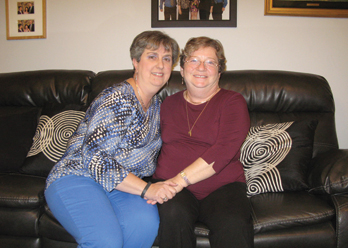 Kati Koves of Budapest, Hungary, was in town last week to visit her first cousin Kate Lebovitz. But while she was in the United States to see friends and family, she was also hoping to drum up support and raise money for her Reform Jewish congregation in Budapest, Sim Shalom.
Kati Koves of Budapest, Hungary, was in town last week to visit her first cousin Kate Lebovitz. But while she was in the United States to see friends and family, she was also hoping to drum up support and raise money for her Reform Jewish congregation in Budapest, Sim Shalom.
“The basic issue is this. There is funding for some synagogues, but they have to be Orthodox or Neolog,” explained Karen Berger, Lebovitz’s daughter who hosted Koves during her visit. A Neolog congregation is more liberal than Orthodox or Chabad, but still maintains separate seating.
“We have a very active congregation and I like sitting next to my husband,” said Koves, noting that there are only about 7,000 Jews in Budapest who are observant. But she believes the number of Jews is closer to 80,000.
“If we can’t raise some money, I don’t know what will happen,” she continued.
“I always knew I had a Jewish identity, but only from my family,” she said. “I like to go to synagogue and tried Neologs, but I wasn’t comfortable there. Sim Shalom is my home, my synagogue, a place where I can be who I am.”
According to the World Jewish Congress, Budapest has some 20 synagogues in which prayers are conducted in a variety of styles, including Neolog, Orthodox, Reform and Chabad. Reform congregations such as Sim Shalom are egalitarian and do not have a mechitzah. Sim Shalom is self-supporting and unlike Orthodox or Neolog congregations, it does not receive any direct funding from the Hungarian government and only a little from international Jewish organizations.
According to the Sim Shalom website, www.simshalom.org, it doesn’t receive any share of Holocaust community restitution funding from the government of Hungary, which adds up to $7 million per year. Sim Shalom officials estimate, however, that the two Reform congregations in the country are supported by almost 10 percent of the total affiliated Jews in Hungary (based on 2011 figures), and is the fastest growing Jewish religious denomination in the country. Koves said Reform congregations did receive government funding, through tax donations, until the law changed in 2011.
Koves, who wears both a mezuzah and a Chai around her neck, said there is a resurgence of anti-Semitism in Hungary now. But she emphatically added, “I am not afraid. I can’t speak for others.” Her mother, Koves said, is a Holocaust survivor and still today is afraid to be openly Jewish.
Sim Shalom is a member of the World Union (WUPJ) and European Union (EUPJ) for Progressive Judaism. Now more than 20 years old, it was the first Progressive Jewish congregation in Hungary. Its leader, Rabbi Katalin Kelemen, was ordained at the Leo Baeck College in London.
In the United States, Friends of Sim Shalom, a California Nonprofit Public Benefit Corporation, has formed to help raise funds for the congregation. Contributions to Friends of Sim Shalom are tax deductible under section 501(c)(3) of the Internal Revenue Code.
To make a donation to Sim Shalom, send a check to: Friends of Sim Shalom, c/o Lowell Nigoff, president, 148 Cherokee Park, Lexington, KY 40503. Credit card or Pay Pal donations may be made at http://www.friendsofsimshalom.org/#donate.



